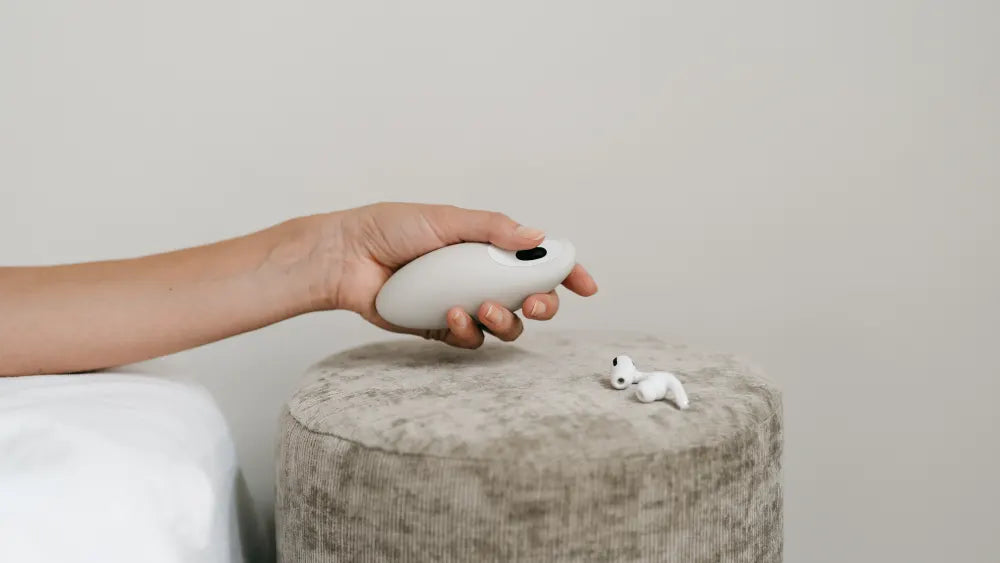
5 evidence-based tips to improve sleep
|
|
Lesezeit 4 min
Try moonbird for 30 days.
We are convinced you will love it.
Happy breathing!

|
|
Lesezeit 4 min
Tossing and turning in your bed at night? Waking up at 4am and not being able to fall back asleep? Most of us have experienced insomnia at one point in our lives. Since the pandemic, the amount of people who suffer from sleeping problems has increased even more. Some experts even have a term for it: ‘coronasomnia’.
We all have better and worse nights. A restless night prior to an exam or presentation is nothing to worry about. However when you experience continuous difficulties with sleeping, it can have serious effects on your life. During sleep, your body heals itself and restores its chemical balance. Without enough sleep, your brain and body systems simply won’t function the way they are supposed to.
Insomnia is a sleep disorder that affects as many as 10% to 20% of all adults. You might think nothing of your insomnia, maybe you are used to it. But the effects of poor sleep can have a serious impact on your mental and physical wellbeing. Think of memory loss, mood changes, weakened immunity, high blood pressure, weight gain and a higher risk of car accidents. All things that can dramatically lower your quality of life.
According to the World Sleep Foundation, common causes of insomnia include stress, an irregular sleep schedule, poor sleeping habits, mental health challenges like anxiety and depression, physical illnesses and pain, medications and neurological problems. For most people, it will be a combination of these factors. Even if you have an idea what causes your insomnia, turning it around is a different story.
You might have tried sleep medication to help you sleep through your nights. Even though this can be a quick ‘win’, the long-term effects aren’t that pretty. Prescribed sleep medication can have side effects and can even lead to addiction. Just like with alcohol, you might think you sleep better with it, but it actually lowers the overall quality of your (deep) sleep. It’s exactly this quality your body needs to heal and restore itself.
Getting a good night’s sleep is one of the most important things for good health and a happy life. What can you do to improve it? Here are 5 evidence-based tips to sleep better at night.
Yes, a shot of coffee enhances your focus and energy and it can be tempting to order an extra flat white during your afternoon dip. However, caffeine stimulates your nervous system and may stop your body from naturally relaxing at night.
One study showed that consuming caffeine up to 6 hours before bed significantly worsened sleep quality. Caffeine can stay elevated in your blood for 6–8 hours, so be careful. Also with tea and chocolate (don’t shoot the messenger).
We know, it’s not the most exciting thing to hear, but trying to get in the habit of waking up and going to bed at similar times is so very important. Sticking to a good routine in which you are consistent with your sleep and waking times can aid long-term sleep quality.
While you might think routines are perfect for just the weekdays, don’t underestimate the power of your weekend. One study noted that participants who had irregular sleeping patterns and went to bed late on the weekends reported poor sleep.
Exercise is one of the best science-backed ways to improve your sleep and your overall mental and physical health. It can enhance all aspects of sleep and reduce symptoms of insomnia.
One study shows that for people with severe insomnia, exercise offered more benefits than most medication. Be careful with exercising late at night though, a high-intensity workout might be stimulating to your nervous system and increase alertness and adrenaline levels. A mindful walk outside or slow yoga session will be a better choice at night.
Nature is actually pretty easy to follow. During the day, we take in light to wake us up and energize us. During the night, the darkness prepares our bodies for a good night’s sleep.
Try to eliminate bright light during the evening, especially blue light coming from your laptop or smartphone. It suppresses hormones like melatonin, which help you relax and get deep sleep. Screens are very addictive, we know, but putting away our devices at night makes a huge difference on your sleep.
5 - Perform slow breathing exercises There is one thing you always have with you: your breath. Your breath is the most efficient tool to help you sleep, the benefits are sky high. Breathing exercises calm your nervous system, staving off insomnia and preparing your body for sleep.
Even better, training your breath is just like any sort of exercise. The more you do it, the better your body responds to it. You'll be able to fall asleep faster at night.
Slow breathing exercises help you fall asleep as they activate your parasympathetic nervous system. With moonbird, we’ve developed the first tactile handheld breathing device that you can effortlessly use with - but also without - your smartphone.
Trouble falling asleep? Waking up in the middle of the night? You don’t want to stumble around, switching on the light, trying to get your tool to work. Or having to grab your smartphone. Simply grab your moonbird, gently shake him to wake him up, hold him in your hand and you can immediately start breathing together.
Sleeping disorders can have a huge impact on your life, we know. We’re here to help you.
P.S. Follow us on Instagram for the latest updates.